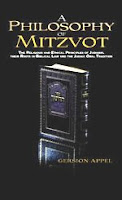
Sefer Ha-Hayim Blog
Thursday, April 17, 2008
The Challenge Is Back
 The second edition of Rabbi Natan Slifkin's The Challenge of Creation is now available in stores and online (link). For those who already own the book, you can download a list of the significant changes here: link - PDF
The second edition of Rabbi Natan Slifkin's The Challenge of Creation is now available in stores and online (link). For those who already own the book, you can download a list of the significant changes here: link - PDFFriday, April 11, 2008
New Book: A Philosophy of Mitzvot

Now available from Yashar Books:
A Philosophy of Mitzvot: The Religious and Ethical Principles of Judaism, their Roots in Biblical Law and the Judaic Oral Tradition
by Rabbi Dr. Gersion Appel
What divine purpose do the mitzvot, the Biblical commandments, serve? What moral and spiritual goals do the mitzvot envision? In a book made newly available to the reading public, Rabbi Dr. Gersion Appel presents a comprehensive view of the structure and meaning of the Torah’s commandments.
The Sefer ha-Hinnukh, one of the principal works in Jewish ethical and halakhic literature, is a primary source for ta’amei ha-mitzvot, the reasons and purpose of the divine commandments in the Torah. In A Philosophy of Mitzvot, originally published in 1975 and revised for this second edition, Rabbi Dr. Gersion Appel sets forth the Hinnukh’s objectives and his approach to revealing the religious and ethical meaning of the mitzvot.
In this wide-ranging study that is ideal for school courses, the author presents a comprehensive view of Jewish philosophy as developed by the Hinnukh and the classical Jewish philosophers. The Hinnukh emerges in this study as a great educator and moral and religious guide, and his classic work as a treasure-trove of Jewish knowledge, religious inspiration, and brilliant insight in the molding of human character.
“Appel’s study is a definitive evaluation of the Hinnuk’s approach. But, more than this, it is an exploration of significant perspectives and new directions for further studies of the meaning of the commandments. The book is comprehensive, informative and authoritative. It is a work of immense scholarship and deserves to be widely read.” —The Jewish Law Annual
Learn more about the book at http://www.yasharbooks.com/Mitzvot.html
Buy the book at http://www.yasharbooks.com/shop
Table of Contents
- Introduction: The Mitzvot: Their Nature and Import in Jewish Philosophy
- The Taryag Mitzvot
- The Quest for the Meaning of Mitzvot
- The Divine Purpose
- The Preamble of Faith
- A Rationale of Mitzvot
- Man's Ethical Duties
- The Individual and Society
- Man's Spiritual Dimension
- The Service of God
- The Divine Imperative
- Perspectives on the Mitzvot
- Conclusion: The Continuing Quest Excursus: The Sefer Ha-Hinnukh: Authorship & Sources
About the Author
Rabbi Dr. Gersion Appel is Yeshiva University Professor Emeritus of Philosophy and Jewish Studies, and formerly Adjunct Professor of Graduate Hebrew Studies in New York University. He received his Torah education in Yeshiva and Mesivta Torah V'Daas and Yeshiva Rabbeinu Yitzchak Elchanan, where he received his Rabbinic ordination (Semicha - '41). He graduated Yeshiva College ('38) and has a Doctor of Hebrew Literature degree from Yeshiva University ('45) and a Doctor of Philosophy degree from Harvard University.
Wednesday, April 02, 2008
Legacy of Maimonides on Tradition Website
A review of The Legacy of Maimonides in Tradition Online (link):
New Books on Rambam
Mar 19, 2008 -- The Legacy of Maimonides: Religion, Reason, and Community, ed. Yamin Levy and Shalom Carmy, Yashar Books, 2006. 307 pages.
Maimonides after 800 Years: Essays on Maimonides and His Influence, ed. Jay M. Harris, Harvard University Press, 2007. 343 pages.
"Yet another book on Maimonides?" So exclaims Jay Harris in the introduction to his new book. Yet nonetheless, these two collections, published in honor of the 800th anniversary of Rambam's death, offer extremely enjoyable readings in the thought of Rambam.
The first work, sponsored by the Maimonides Heritage Center, includes 14 essays, 8 of which are translations or reproductions of previously published articles. The opening essay by Prof. Isadore Twersky details Rambam's unique image within Jewish historical consciousness, comparing laudatory statements about him with those about other great sages, and then continues to delineate Twersky's understanding of how and why Rambam achieved such a unique status. It's a great article, and note as well the dedication: "Dedicated to the memory of my teacher and father-in-law, the ga'on R. Yosef Dov ha-Levi Soloveitchik, zz"l - the Maimonides of our generation."
Other pieces include Rabbi Lamm's article on Ahavat Hashem and Arthur Hyman's introduction to interpreting Rambam. Roslyn Weiss and Hayyim Angel contribute stimulating articles regarding the role of Rambam in parshanut. This is a useful collection which both scholars and laymen will enjoy.
The second work, drawing from a 2004 conference sponsored by Harvard Center for Jewish Studies, includes 16 new essays by leading Maimonidean scholars. Moshe Halbertal's fantastic essay analyzes the ambiguous goals and accomplishments of Mishneh Torah - did Rambam really intend to replace earlier literature of Torah She-Be'al Peh? Carlos Fraenkel submits a basic summary of his dissertation, nuancing Samuel Ibn Tibbon's relationship to Maimonides and his philosophy. Bernard Septimus and Haym Soloveitchik contribute important analyses of literary elements of Mishneh Torah, with Septimus focusing on Sefer Ha-Madda and Soloveitchik examining Hilchot Shabbat.
This is a very important collection which scholars will continue to consult for new ideas and trends in Maimonidean scholarship.
- Shlomo Brody
2023 © www.yasharbooks.com